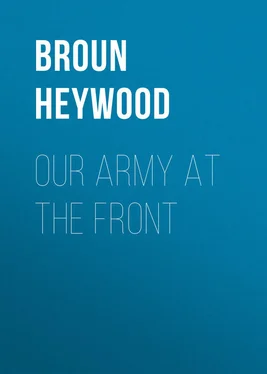Heywood Broun - Our Army at the Front
Здесь есть возможность читать онлайн «Heywood Broun - Our Army at the Front» — ознакомительный отрывок электронной книги совершенно бесплатно, а после прочтения отрывка купить полную версию. В некоторых случаях можно слушать аудио, скачать через торрент в формате fb2 и присутствует краткое содержание. Жанр: foreign_prose, foreign_antique, foreign_language, на английском языке. Описание произведения, (предисловие) а так же отзывы посетителей доступны на портале библиотеки ЛибКат.
- Название:Our Army at the Front
- Автор:
- Жанр:
- Год:неизвестен
- ISBN:нет данных
- Рейтинг книги:5 / 5. Голосов: 1
-
Избранное:Добавить в избранное
- Отзывы:
-
Ваша оценка:
- 100
- 1
- 2
- 3
- 4
- 5
Our Army at the Front: краткое содержание, описание и аннотация
Предлагаем к чтению аннотацию, описание, краткое содержание или предисловие (зависит от того, что написал сам автор книги «Our Army at the Front»). Если вы не нашли необходимую информацию о книге — напишите в комментариях, мы постараемся отыскать её.
Our Army at the Front — читать онлайн ознакомительный отрывок
Ниже представлен текст книги, разбитый по страницам. Система сохранения места последней прочитанной страницы, позволяет с удобством читать онлайн бесплатно книгу «Our Army at the Front», без необходимости каждый раз заново искать на чём Вы остановились. Поставьте закладку, и сможете в любой момент перейти на страницу, на которой закончили чтение.
Интервал:
Закладка:
The privates were prepared to hear the French speak their own language at mention of Alsace-Lorraine and war aims, or to propound their private philosophies that way. They granted the right of the French to talk how they pleased of their emotional pleasure at seeing the troops, or of any other subject above the timber-line.
What staggered them was the insane top-loftiness of using French to ask for ham and eggs, and beer, or the way to camp. For nothing, not volumes of warning before they left home, nor interminable hours of French-grammar instruction on board the troop-ships, had really got it deep inside the American private's head that French was not an accomplishment to be used as evidence of cosmopolitan culture, but a mere prosy necessity, without which daily existence was a nightmare and a frustration.
The French, on their side, were helpless enough, but not so bewildered. They had lived too long, in peace as well as war, across a narrow channel from that stanch English-speaking race who brought both their tea and their language with them to France and everywhere else, to be dumfounded that strangers should balk at their foreign tongue.
The inevitable result was that here, in their first contact with the French, as later, throughout the fighting areas, the American soldiers learned to understand French-English long before they could speak a decent word of French.
Fortunately for the First Division, it had had some able bilingual forerunners at the seaport town where they landed. The camps had been built by the French, a few miles back from the town, but a few of the housekeeping necessities had been installed by General Pershing's staff-officers, and signs in good, plain English showed the proper roads. And as the single files of soldiers began to descend the gang-plank of the first transport, and to form for marching to camp, their own officers were having some compact instruction from the staff-officers on how to get to camp and what to do when they got there.
There was no waste motion about getting the troops under way. The first companies were tramp-tramping up the streets before the last companies were overside, and the first transport was free to go back and give place to the next one before the mayor had got his red sash and gilt chains in place and arrived to do them suitable honor.
So, while the shore watchers fell back into safe observation-posts, the soldiers clattered down through the quay-sheds to the little street, formed and swung away, and one ship after another disgorged its passengers, and presently the sheds were overrun with the blue-clad sailors from the convoys.
All that day, the soldiers marched through the town. Their camps lay at the end of a long white shore road, and jobs were not wanting when they got there. Their pace was easy, because of these things, and they probably would not have put out any French eye with their flawless marching, even under less indulgent circumstances. For this First Division was recruited in a hurry, and most of their real training lay ahead of them.
Where they were impressive was in their composite build. There were little fellows among them, but they straggled at the back. The major part of the soldiers were tall, thin, rangy-looking, with a march that was more lope than anything else and a look of heaving their packs along without much effort. They fell about midway between the thin, breedy look of the first English troops in France and the stocky, thick-necked sort that came later.
The marines were the pick of the lot, for size and behavior too. The sense of being something special was with the marines from the first. They marched that way. And, set apart by their olive drab as well as by their size and comportment, they gave that First Division's first march in France a quality of real distinction. And when the army got to its first French camps, the welcome sight its eyes first fell upon was that of already arrived marines carrying water down the hill.
The camps were long wooden buildings, rather above the average, as became the status of the visitors, built almost at the top of a hill, looking down over green fields and round trees to the three or four villages within range of vision, and beyond them to the sea.
Some supplies were there already, but the soldiers had had to bring most of their first supper, and the camp-cooks had their own troubles getting things just so.
Major-General Sibert, field commander of the First Division, had quarters at camp, so that excuses were not in order. Even for that first supper, the marines and all others they could commandeer to help them were rushing about preparing things to the very top of their bent. Nobody had town-leave for the first day or two, till things were in apple-pie order, and the camp was in line to shelter and feed its soldiers for as long as it should be necessary to stay there.
If camp life was busy these days, the town life was no less so. The chief hotel, wherein much red plush met the eye from the very entrance, was swarming with officers of both nations and all degrees of rank. General Pershing was there, with his aides and most of his staff. Admirals were there, changing uniforms from blue to white and back again as the erratic French weather dictated.
There were half a dozen high officers from the French Army, making both formal and informal welcomes, and there were more busy majors and captains and more interpreters than you could count in half a day's time.
The little Frenchwoman who sat behind the desk was amiable to the best of her very considerable ability, but the questions she had to answer, whether she understood them or not, would have addled an older head than hers. She could run her hotel with the best of them, but when perfectly sane-looking young officers asked her where to buy five thousand cups and saucers, and paper napkins by the ton, she said in so many words that an American invasion was worse than bedlam.
The hotel's second floor was the favored place for conferences. There a fair welter of red plush was drawn up around a big table in the hallway, and livid red wall-paper added its warmth to a scene which against a plank wall would not have lacked color.
At this table General Pershing could have been found much of the time. The whole practical liaison of French and American Armies was contrived here, though the first rule for this consolidation laid down by a grizzled French general with but one arm left, was that "there was no longer anything that was French, or anything that was American, but merely all we had that was 'ours,'" so that the task was one of detail only.
Though the daytimes were packed with work, most of the officers called it a day at sunset. Then the little hotel took on its most engaging color. The little French piano tinkled out in the warm air with an accompaniment of many voices. Once a very blue young second lieutenant chose to express his mood by repetitions without number of the melancholy "Warum?" – probably the first German music that had been heard from that piano for many a moon. Possibly those of the French who knew what the tune was recognized also that America had turned a point in more ways than one in coming to France, not least among them being making good American soldiers out of erstwhile good Germans. Nobody seemed much astonished or put out when within the day a goodly number of American soldiers were speaking to German prisoners in their own language, though talking to the German prisoners, aside from the fact that it was not encouraged by the French, turned out to be indifferent fun, since the American soldiers had had their fill of German propaganda before they left home, and none of the prisoners was overmodest as to what Germany was or would do.
The cafés out-of-doors were overflowing with Americans, too. It was plenty of fun to hear the sailors scolding the French waitresses for calling lemons "limons," and trying to overhaul the French pronunciation of "bière" to something approaching a compromise.
Читать дальшеИнтервал:
Закладка:
Похожие книги на «Our Army at the Front»
Представляем Вашему вниманию похожие книги на «Our Army at the Front» списком для выбора. Мы отобрали схожую по названию и смыслу литературу в надежде предоставить читателям больше вариантов отыскать новые, интересные, ещё непрочитанные произведения.
Обсуждение, отзывы о книге «Our Army at the Front» и просто собственные мнения читателей. Оставьте ваши комментарии, напишите, что Вы думаете о произведении, его смысле или главных героях. Укажите что конкретно понравилось, а что нет, и почему Вы так считаете.












